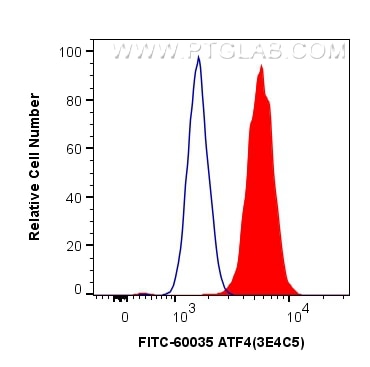ATF4 Monoklonaler Antikörper
ATF4 Monoklonal Antikörper für FC
Wirt / Isotyp
Maus / IgG1
Getestete Reaktivität
human, Maus, Ratte
Anwendung
FC
Konjugation
FITC Plus Fluorescent Dye
CloneNo.
3E4C5
Kat-Nr. : FITC-60035
Synonyme
Galerie der Validierungsdaten
Geprüfte Anwendungen
| Erfolgreiche Detektion in FC | HepG2-Zellen |
Empfohlene Verdünnung
| Anwendung | Verdünnung |
|---|---|
| Sample-dependent, check data in validation data gallery | |
Produktinformation
FITC-60035 bindet in FC ATF4 und zeigt Reaktivität mit human, Maus, Ratten
| Getestete Reaktivität | human, Maus, Ratte |
| Wirt / Isotyp | Maus / IgG1 |
| Klonalität | Monoklonal |
| Typ | Antikörper |
| Immunogen | ATF4 fusion protein Ag1279 |
| Vollständiger Name | activating transcription factor 4 (tax-responsive enhancer element B67) |
| Berechnetes Molekulargewicht | 39 kDa |
| Beobachtetes Molekulargewicht | 45-50 kDa |
| GenBank-Zugangsnummer | BC022088 |
| Gene symbol | ATF4 |
| Gene ID (NCBI) | 468 |
| Konjugation | FITC Plus Fluorescent Dye |
| Excitation/Emission maxima wavelengths | 495 nm / 524 nm |
| Form | Liquid |
| Reinigungsmethode | Protein-G-Reinigung |
| Lagerungspuffer | BS mit 50% Glyzerin, 0,05% Proclin300, 0,5% BSA, pH 7,3. |
| Lagerungsbedingungen | Bei -20°C lagern. Vor Licht schützen. Nach dem Versand ein Jahr stabil. Aliquotieren ist bei -20oC Lagerung nicht notwendig. 20ul Größen enthalten 0,1% BSA. |
Hintergrundinformationen
What is the molecular weight of ATF4?
The molecular weight of ATF is 38.6 kD.
What is ATF4?
Activating transcription factor 4 (ATF4), also known as cAMP-response element-binding protein 2 (CREB2), is a substrate of RSK2 and a basic leucine-zipper transcription factor (PMIDs: 16000305, 17485283).
What the function of ATF4?
ATF4 its a transcription factor that controls the transcriptional activity of mature osteoblasts. ATF4 is particularly critical for their timely onset and terminal differentiation, as well as expression of Bsp and osteocalcin. Knockout animals displayed reduction or delay in bone mineralization and have severely reduced bone volume. ATF4 is also part of the PERK-eIF2α-ATF4-CHOP apoptosis pathway, which is activated by ER stress, and it likely plays a role related to tumor cell survival (PMIDs: 18083928, 16000305, 30134550).
What is the effect of ATF4 interaction with RSK2?
ATF4 and RSK2 posttranscriptionally regulate type I collagen synthesis. Lack of RSK2 phosphorylation of AFT4 may contribute to skeletal phenotypes associated with Coffin-Lowry Syndrome (PMID: 17485283).
Where is ATF4 expressed?
ATF4 protein is predominantly expressed in osteoblasts, although its corresponding Atf4 mRNA is ubiquitously expressed (PMID: 16000305).
What regulates ATF4 expression?
ATF4 is regulated by a ubiquitin/proteasomal pathway, which is less active in osteoblasts by inhibition with MG115 (PMID: 16000305).
How does ATF4 expression affect Ocn mRNA?
Inhibition of the degradation pathway leads to ATF4 accumulation and induces Ocn mRNA expression in non-osteoblastic cells (PMID: 16000305).
Does ATF4 have the ability to induce osteoblast-specific gene expression even in non-osteoblastic cells?
Yes, ATF4, as well as other osteoblast differentiation factors, has this ability. AFT4 interactions with Runx2 can stimulate osteoblast-specific osteocalcin gene expression. (PMIDs: 16000305, 17485283)
Protokolle
| Produktspezifische Protokolle | |
|---|---|
| FC protocol for FITC Plus ATF4 antibody FITC-60035 | Protokoll herunterladen |
| Standard-Protokolle | |
|---|---|
| Klicken Sie hier, um unsere Standardprotokolle anzuzeigen |


